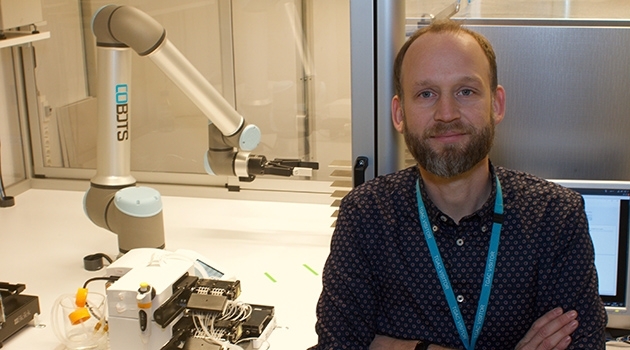Self-learning machines take the step into drug discovery
In the winter of 2020, a novel robotised laboratory for cell profiling will open at Uppsala's Biomedical Centre – a high-tech facility ready to deliver as the Knut and Alice Wallenberg Foundation now invests SEK 3.1 billion in making Sweden a world leader in computer-driven life sciences.
Artificial Intelligence and self-learning machines have in a short time taken the step from scientific utopia to an integrated part of our daily lives. Every time your self-propelled vacuum cleaner rounds the sofa corner or Spotify recommends the artist you did not know you like, they are there. And the development is accelerating, in Linköping the country's first self-driving buses are already on a roll. Now the expectations are increasing on what this technology can add to the field of medicine and pharmacy.
“Intelligent systems are constantly opening new doors in biomedical research. Many experiments generate such huge amounts of data that conventional methods are not enough. By developing algorithms that allow computers to draw their own conclusions and find new patterns, we can accelerate the development of both new drugs and their implementation in healthcare,” says Ola Spjuth, Professor of pharmaceutical bioinformatics at Uppsala University.
The first drug candidate to be developed entirely with the help of AI is already in a phase I study. It is a molecule created in collaboration between companies in the UK and Japan, where algorithms have been used to select the relevant compound from parameters in databases. The process, which with traditional methods would require over four years, was now carried out in twelve months, announce the parties that will now take the technology further to develop drugs for cancer and cardiovascular disease.
“In the pharmaceutical industry, automation is extremely hot, but due to the high costs that surround the infrastructure we lack a corresponding upswing within the academy. Aware of the great values such a resource will add, our group began building our own robotic lab based on open source methodology. The components have only cost us a fraction compared to buying a ready-made solution, and when we go into operation within a few months, it constitutes a flexible environment with the capacity to perform all experimental steps in large scale cell profiling with microscopy and subsequent data analysis.”
For the field's Swedish explorers, the scene is unrecognizable from just a few years ago. From being an almost exotic element, they are today united in the billion investment Wallenberg AI, Autonomous Systems and Software Program (WASP), our country's largest single research program ever. In October, Uppsala University inaugurated AI4Research, an interdisciplinary environment aiming to identifying new areas where machine learning can contribute to solving society's challenges. Just weeks later, the Knut and Alice Wallenberg Foundation announced that they will invest SEK 3.1 billion until 2032 in making Sweden a world leader in data-driven life sciences, which will be hosted at the Science for Life Laboratory. Ola Spjuth, who also is AI-coordinator at SciLifeLab Data Center, welcomes the initiatives:
“Our research group is highly interdisciplinary. We have competencies in such diverse areas as data analysis, chemistry, software development, biology, engineering and drug screening. It is an effective, yet unusual approach that has for long placed us in-between the major calls in medicine and technology. In parallel with constructing our open source robotized laboratory, we have also spent large efforts on building automatic analysis pipelines and databases with large scale data storage, coupled to resources for enabling AI-modelling and automated, iterative experiments.”
Today, the group makes all its methods, code and data available via open access. Through their website, they offer software and online services that are being used in academia and industry around the world. The undergraduate education that the team is involved in are also presented here, a prioritised activity that already during the current academic year will be supplemented with the new university course Big Data in Life Science, and in 2022 a course on Lab Automation.
“We have been successful in attracting highly qualified co-workers and also welcome several degree projects each semester. The fact that we are now preparing an education in Lab Automation is a strategically important effort in line with our goal to develop a fully automated lab, in which an AI after a completed experiment also points out the direction for the next experiment. Once there, the step from individual predictions to considerably more complex goals will be within reach and help us contribute to both testing and optimisation of treatment strategies that are not possible today.”
Magnus Alsne
Facts
- In October, the Knut and Alice Wallenberg Foundation announced that they will invest SEK 3.1 billion until 2032 to make Sweden a world leader in computer-driven life sciences.
- By linking biology, advanced biotechnology, the computing power of supercomputers and AI, the foundation wants to develop tailored drugs and better protection against virus pandemics.
More information
- Research in pharmaceutical bioinformatics
- Meet the group online https://pharmb.io/

